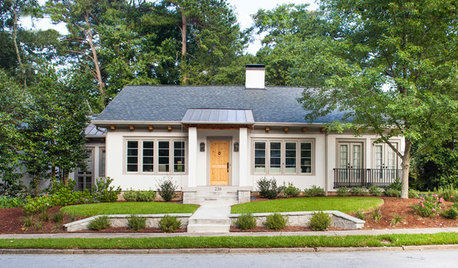Buying a foreclosure flip
Northlut
12 years ago
Related Stories

BEFORE AND AFTERSHouzz Tour: A Georgia Foreclosure Gets a Major Overhaul
Gutting and redesigning turn a mishmash 1925 home into a unified haven with better flow
Full Story
MOVING5 Risks in Buying a Short-Sale Home — and How to Handle Them
Don’t let the lure of a great deal blind you to the hidden costs and issues in snagging a short-sale property
Full Story
MY HOUZZMy Houzz: After Renovating, a Family Flips Over Its House
What started as a 'buy, renovate and flip' project turns into so much more for a creative family in Australia
Full Story
KITCHEN PANTRIES80 Pretty and Practical Kitchen Pantries
This collection of kitchen pantries covers a wide range of sizes, styles and budgets
Full Story
CURB APPEAL77 Front Doors to Welcome You Home
Crossing the threshold is an event with these doors in a gamut of styles
Full Story
KITCHEN DESIGN91 Kitchen Banquettes to Start Your Morning Right
Slide into one of these stylish breakfast nooks and stay awhile
Full Story
HOME OFFICESPhoto Flip: 95 Deskscape Dazzlers
Whether you work from home or just need a stylish space in which to pay the bills, these office spaces make the grade
Full Story
DECORATING GUIDESOn Trend: You'll Flip for These Double-Duty Furniture Designs
Multiply your options in a small space with chairs and art that become tables, a sofa that becomes a bed and more
Full Story
Let's Dish! Did You Watch the Flipping Out Premiere?
Contemporary Remodel Kicks off Design Show's New Season. What Did You Think?
Full Story
DECORATING GUIDESHomeowners Are Flipping for Push-Button Light Switches
Button-style switches are hot off the presses again, making news in new homes and antique remodels
Full StoryMore Discussions






gmp3
C Marlin
Related Professionals
Saint Louis Park Architects & Building Designers · New Bern General Contractors · Berkeley General Contractors · Kemp Mill General Contractors · Klahanie General Contractors · Lakewood Park General Contractors · Las Cruces General Contractors · Parkersburg General Contractors · Rossmoor General Contractors · Stillwater General Contractors · University Park General Contractors · Van Buren General Contractors · Williamstown General Contractors · Miami Home Stagers · Sweetwater Interior Designers & Decoratorswritersblock (9b/10a)
NorthlutOriginal Author
brickeyee
C Marlin
jane__ny
brickeyee
marie_ndcal
pinusresinosa
jmc01
brickeyee